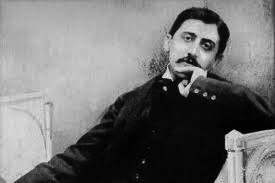Ah, such lovely words. Though most of my time is spent teaching English, I also coach Varsity Girls basketball, and it was with dismay and wry pleasure that I received this excuse from a player who would be missing practice Sunday:
I can’t make basketball practice because of Proust.
That was it—no elaboration. Not exactly “my dog ate my homework.” Seriously, could there be a better excuse? What has Proust done?! It turns out, some of my students from the French-American School of New York will read during “Swann’s Way: A Nomadic Reading,” a week-long homage to the French writer’s sprawling In Search of Lost Time (a.k.a. A Remembrance of Things Past), published Nov. 14, 1913.
The novel’s long, complex, sinuous sentences will surely challenge the 120 or so readers recruited by the French Consulate to celebrate the centennial. For example, count the commas in this rumination on the tasting of a madeleine:
Mais, quand d’un passé ancien rien ne subsiste, après la mort des êtres, après la destruction des choses, seules, plus frêles mais plus vivaces, plus immatérielles, plus persistantes, plus fidèles, l’odeur et la saveur restent encore longtemps, comme des âmes, à se rappeler, à attendre, à espérer, sur la ruine de tout le reste, à porter sans fléchir, sur leur gouttelette presque impalpable, l’édifice immense du souvenir.
In French, we don’t really have “run-on sentences.” Proust’s dense prose style possesses a poetic rhythm (note the runs of parallel constructions in the passage above, the calmer bits, and then the insistent repetitions). It’s syncopated and jazzy, like Ella Fitzgerald. The kids and other readers will be up for the challenge, provided they’ve practiced!
So if you want to bail on your plans this week, just blame Proust. And yes, there will be madeleines.
—Tom Faure
